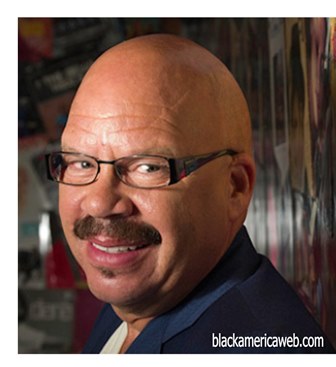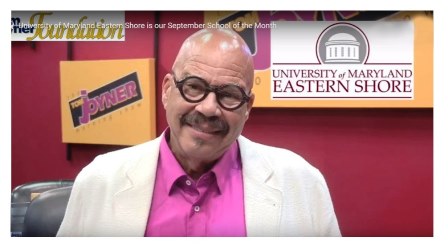
UPDATE: Mr. Joyner informed UMES Dec. 6 he would be unable to serve as speaker
Thursday, November 8, 2018
Philanthropist-broadcaster Tom Joyner will put an exclamation point on his recent efforts to help the University of Maryland Eastern Shore boost its scholarship fund by serving as the December 2018 commencement speaker.
Joyner will be just the fourth person to deliver two UMES commencement addresses since it became a baccalaureate degree-granting institution in the mid-20th century. Fisk University President Henry Ponder (1989, 1997), National Urban League executive Julius Thomas (1950, 1969) and Lincoln University President Horace Mann Bond (1948, 1961) are the others.
The Dec. 14 ceremony in the William P. Hytche Athletic Center begins at 10 a.m.
Joyner, who turns 69 this month, is winding down a wildly successful broadcasting career that also made him a sought-after public speaker and a cultural touchstone.
It was 15 years ago Joyner first came to UMES to address the Class of 2003 and accept an honorary degree in recognition of his efforts to draw attention to the role historically black institutions play in the nation’s education landscape.
The Tom Joyner Foundation earlier this year promoted UMES nationally as its “School of the Month” for September 2018, part of an ongoing campaign to inspire his listeners to support Historically Black Colleges and Universities. UMES previously was tapped for that role in August 2009.
The son of a Tuskegee Airman, Joyner grew up in the small Alabama town where black pilots trained during World War II. He graduated from Tuskegee Institute in 1970 with a sociology degree and immediately embarked on a broadcasting career — based primarily in the south and Midwest.

“I’ve only done radio my entire life,” he told the Atlanta Journal-Constitution newspaper earlier this year. “No other job.”
Over the past four-plus decades, he has become a legend in urban contemporary radio, mixing humor with positive messages.
At one point, Joyner’s popularity had him holding down two jobs simultaneously — a morning show in Dallas and an afternoon show in Chicago, which earned him the nicknames “The Fly Jock” and the “Hardest Working Man in Radio.”
“This commute and his rich on air style,” his online biography says, “gained him national publicity and high ratings.”
While Joyner skillfully — and some would say tirelessly — grew his audience numbering into the millions through syndication of his show, he drew inspiration from experiences growing up a black man in the South and attending a historically black institution.
He launched his eponymous foundation as a philanthropic arm of his entrepreneurial career and identified HBCUs and the students who attend them as the foundation’s beneficiaries.
Joyner successfully used his broadcasting skills and radio show as a platform to entertain and inform – and raise tens of millions of dollars to support higher education for minorities.
“First we get people laughing, then we get ’em to listen,” Joyner says in his online biography. “If you can get people to listen, then they begin to think, and that’s when they start making a difference.”
Joyner is a member of the Radio Hall of Fame and received Impact Magazine’s “Joe Loris Award” for Excellence in Broadcasting. Billboard magazine honored him with its “Best Urban Contemporary Air Personality” award. Impact Magazine’s “Best DJ of the Year Award” is known as “The Tom Joyner Award” because he received it so many times, his biography notes.

